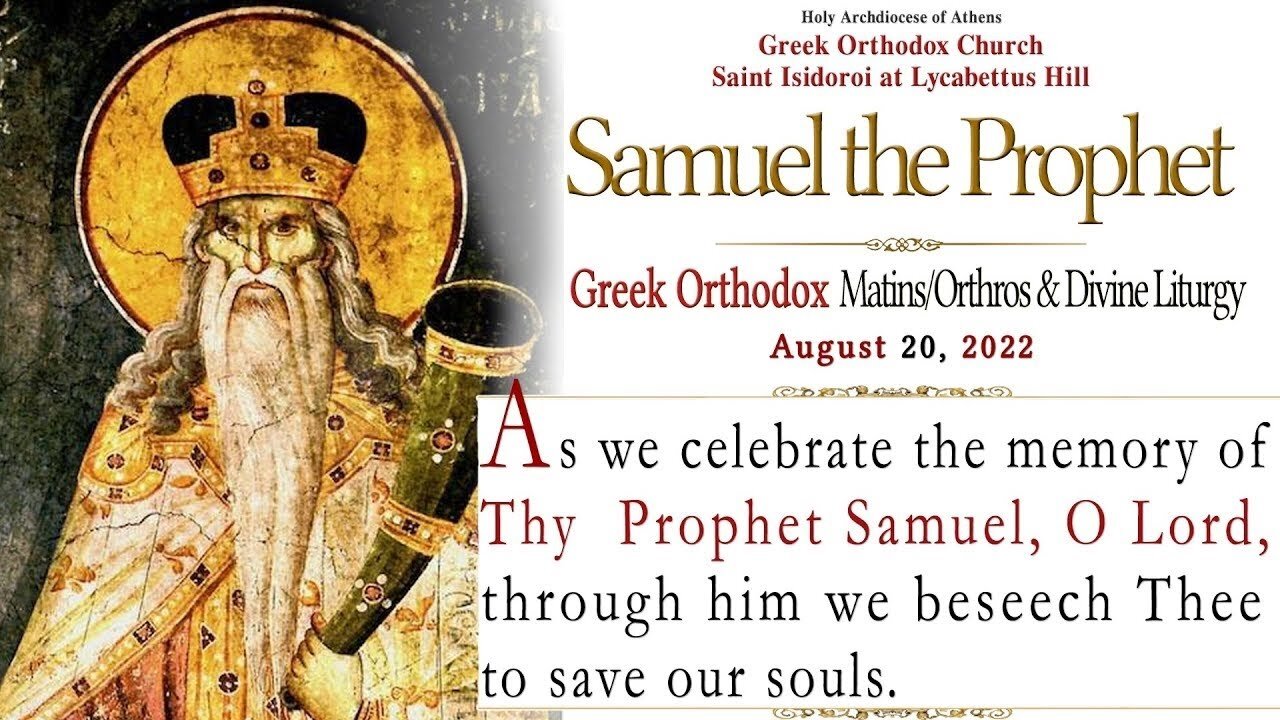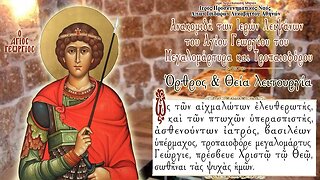Premium Only Content

August 20, 2022, Samuel the Prophet | Greek Orthodox Divine Liturgy
Saints and Feasts: Samuel the Prophet; Holy Martyr Luke of Bouleutos; Stephen, First King of Hungary; Hierotheos, Bishop of Hungary; Oswin the Martyr, King of Deira; Afterfeast of the Dormition of our Most Holy Lady the Theotokos and Ever Virgin Mary
Epistle Reading: Romans 15:30-33
Brethren, I appeal to you, by our Lord Jesus Christ and by the love of the Spirit, to strive together with me in your prayers to God on my behalf, that I may be delivered from the unbelievers in Judea, and that my service for Jerusalem may be acceptable to the saints, so that by God’s will I may come to you with joy and be refreshed in your company. The God of peace be with you all. Amen.
Gospel Reading: Matthew 17:24-27; 18:1-4
At that time, the collectors of the half-shekel tax went up to Peter and said, “Does not your teacher pay the tax?” He said, “Yes.” And when he came home, Jesus spoke to him first, saying, “What do you think, Simon? From whom do kings of the earth take toll or tribute? From their sons or from others?” And when he said, “From others,” Jesus said to him, “Then the sons are free. However, not to give offense to them, go to the sea and cast a hook, and take the first fish that comes up, and when you open its mouth you will find a shekel; take that and give it to them for me and for yourself.”
At that time the disciples came to Jesus, saying, “Who is the greatest in the kingdom of heaven?” And calling to him a child, he put him in the midst of them, and said, “Truly, I say to you, unless you turn and become like children, you will never enter the kingdom of heaven. Whoever humbles himself like this child, he is the greatest in the kingdom of heaven.”
This most holy man, a Prophet of God from childhood, was the last judge of the Israelite people, and anointed the first two Kings of Israel. He was born in the twelfth century before Christ, in the city of Armathaim Sipha, from the tribe of Levi, the son of Elkanah and Hannah (Anna). He was the fruit of prayer, for his mother, being barren, conceived him only after she had supplicated the Lord with many tears; wherefore she called him Samuel, that is, "heard by God." As soon as Hannah had weaned him, she brought him to the city of Silom (Shiloh), where the Ark was kept, and she consecrated him, though yet a babe, to the service of God, giving thanks to Him with the hymn found in the Third Ode of the Psalter: "My heart hath been established in the Lord . . ." Samuel remained in Silom under the protection of Eli the priest. He served in the Tabernacle of God, and through his most venerable way of life became well-pleasing to God and man (I Kings 2: 26). While yet a child, sleeping in the tabernacle near the Ark of God, he heard the voice of God calling his name, and foretelling the downfall of Eli; for although Eli's two sons, Ophni and Phineas, were most lawless, and despisers of God, Eli did not correct them. Even after Samuel had told Eli of the divine warning, Eli did not properly chastise his sons, and afterwards, through various misfortunes, his whole house was blotted out in one day.
After these things came to pass, Samuel was chosen to be the protector of the people, and he judged them with holiness and righteousness. He became for them an example of all goodness, and their compassionate intercessor before God: "Far be it from me that I should sin against the Lord in ceasing to pray for you; yea, I will serve the Lord, and show you the good and the right way" (ibid. 12:23). When he asked them -- having God as witness -- if he ever wronged anyone, or took anyone's possessions, or any gift, even so much as a sandal, they answered with one voice: "Thou hast not defrauded us, nor oppressed us, nor afflicted us, neither hast thou taken anything from anyone's hnd" (ibid. 12:4). When Samuel was old, the people asked him for a king, but he was displeased with this, knowing that God Himself was their King. But when they persisted, the Lord commanded him to anoint them a king, saying, "They have not rejected thee, but they have rejected Me from reigning over them" (ibid. 8:7); so Samuel anointed Saul. But Saul transgressed the command of God repeatedly, so Samuel anointed David. Yet, since Samuel was a man of God, full of tender mercy, when the Lord told him that He had rejected Saul, Samuel wept for him the whole night long (ibid. 15:11); and later, since he continued to grieve, the Lord said to him, "How long wilt thou mourn for Saul?" (ibid. 16:1). Having lived blamelessly some ninety-eight years, and become an example to all of a God-pleasing life, he reposed in the eleventh century before Christ. Many ascribe to him the authorship of the Books of judges, and of Ruth, and of the first twenty-four chapters of the First Book of Kings (I Samuel)
-
 2:52:42
2:52:42
Greek Orthodox Church St. Isidoroi, Athens, Greece
2 years agoNovember 3, 2022, Transfer of Holy Relics of Martyr St. George | Greek Orthodox Divine Liturgy
831 -
 1:31:39
1:31:39
The Quartering
2 hours agoAlex Jones Goes To WAR With Owen Shroyer, Are All Women Terrible?, Woke Backfire Of The Year!
70.3K19 -

The White House
6 hours agoPresident Trump Makes an Announcement, Sep. 2, 2025
8.86K15 -
 2:15:05
2:15:05
MattMorseTV
3 hours ago $9.90 earned🔴Trump's Oval Office BOMBSHELL.🔴
15.3K19 -
 18:14
18:14
Real Estate
15 hours ago $0.38 earnedRising Prices PUSHING AMERICANS OVER THE EDGE
6.39K1 -
 1:43:35
1:43:35
Russell Brand
3 hours agoTrump Demands Big Pharma PROVE Covid Vaccine Is Safe – Did Pfizer LIE?! - SF626
131K25 -
 LIVE
LIVE
Due Dissidence
4 hours agoIsrael THREATENS Greta, InfoWars Host QUITS, FL Losing $200M on EMPTYING Alligator Alcatraz
937 watching -
 6:09:56
6:09:56
Law&Crime
7 hours ago $0.84 earnedLIVE: Adelson Matriarch Murder Trial — FL v. Donna Adelson — Day 6
12.8K -
 1:08:04
1:08:04
Sean Unpaved
3 hours agoGridiron Shocks: Arch's Rough Start, Belichick's Tar Heel Tumble, & NFL Week 1 Buzz
29.5K -
 1:47:00
1:47:00
Professor Nez
2 hours ago🚨🇺🇸President Trump makes MAJOR Announcement from Oval Office TODAY!
9.2K5